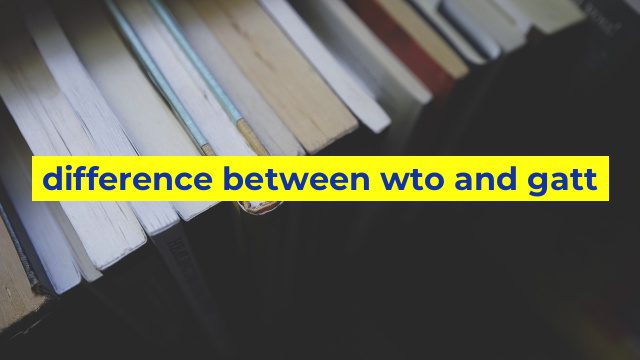The Difference Between WTO and GATT
The World Trade Organization (WTO) and the General Agreement on Tariffs and Trade (GATT) are international organizations that play a significant role in regulating global trade. While the WTO is the successor to the GATT, these two entities are different in various ways. Here is a closer look at the differences between the WTO and GATT:
Membership
GATT was established in 1948 and had a membership of 23 countries. Over the years, the number of members grew to 128 before it was replaced by the WTO in 1995. Today, the WTO has 164 member countries, making it a more comprehensive organization than GATT.
Scope
GATT was focused only on the regulation of trade in goods, while the WTO encompasses a broader range of products and services, including intellectual property and agricultural trade. The WTO also covers areas beyond the traditional scope of trade policy, such as investment and competition policy.
Dispute Settlement Mechanism
The dispute settlement mechanism under GATT was less formal compared to the WTO. GATT relied on consultations between the parties in dispute and decisions were often reached through informal means. On the other hand, the WTO has a more structured dispute settlement mechanism that includes a panel of experts who hear the parties’ arguments and render binding decisions. Additionally, the WTO allows for appeals, whereas GATT did not.
Decision-Making
In the GATT, decisions were made based on consensus among members. This meant that any member could veto a decision, even if it meant delaying progress or preventing agreement. However, the WTO has a more democratic decision-making process, where decisions are made by a majority vote.
In conclusion, while the WTO is built on the foundation of GATT, it has evolved to become a more comprehensive and structured organization. The WTO covers a wider range of issues, has a more formal dispute settlement mechanism, and a more democratic decision-making process. Understanding the differences between the two organizations is crucial for countries engaging in global trade.
Table difference between wto and gatt
| WTO | GATT | |
|---|---|---|
| Full Form | World Trade Organization | General Agreement on Tariffs and Trade |
| Year of Establishment | 1995 | 1947 |
| Members | 164 (as of March 2021) | 164 (as of March 2021) |
| Objectives | To promote free and fair trade among member countries, and to provide a forum for negotiating and monitoring trade agreements | To reduce trade barriers and tariffs between member countries |
| Dispute Settlement Mechanism | Has a stronger and more formalized dispute settlement system known as the Dispute Settlement Body | Had a less formal dispute settlement system that relied on consensus among member countries |
| Agreements | Has broader range of agreements covering agriculture, services, intellectual property, and investment | Primarily focused on trade barriers for goods and did not address issues such as services, intellectual property, and investment |
| Decision-making Process | Based on consensus among member countries | Based on consensus among member countries |
